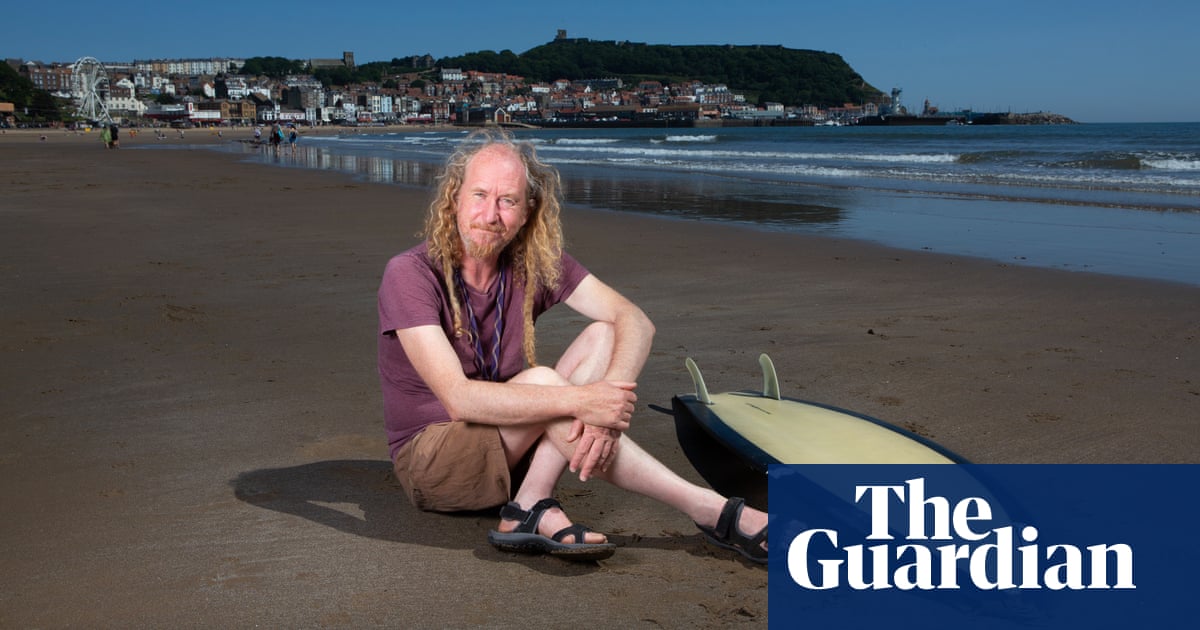
Jill Reidy discovered sea swimming just last year, but the impact on her life has already been tangible. “I almost immediately noticed an improvement in my mental health and feelings of wellbeing,” says Reidy, who is 71 and lives in Blackpool. “I was persuaded to try it and have not looked back. It’s like being a kid again when you’re screaming and jumping over the waves.”
This summer, though, sewage alerts have forced her out of the water. Reidy, who is part of a group who swim at Cleveleys beach, a few miles north of the resort, has only been in a handful of times since mid-June, whereas normally she swam at least four times a week, wearing a wetsuit and gloves in the winter.
The group decides whether to swim by using apps that track pollution levels and they have been kept out of the sea before, but this summer appears particularly bad. According to data from Surfers Against Sewage, while 24 water quality alerts were issued for the beach in 2022, there have already been 38 warnings in 2023.
The swimmers have been in contact with local MPs and the area’s water company, United Utilities. “This year has been a total letdown. Our group has spent more time campaigning against the pollution than we have swimming. It’s been a crushing blow to morale and wellbeing,” says Reidy.
She tried to replicate the sea’s benefits by taking cold showers, but, unsurprisingly, it wasn’t the same. “There’s such a feeling of camaraderie – that is what everyone has missed. We are a group of mostly older women and many have long-term health problems that are helped by going in the water. It felt like we lost a whole community.”
Although the government has given permission for unlimited fines on polluting water companies and demanded that they upgrade infrastructure to reduce discharges, many swimmers are likely to remain reluctant to return to the water unless conditions massively improve. Almost a quarter of the UK’s sea swimmers may avoid the ocean this year because of sewage dumping, according to a poll by Savanta for the Liberal Democrats last month.
Ben Howarth, 57, says he used to be a kitesurfer, making regular trips from his home in Hertfordshire to the coast – until his daughter became ill with E coli after a beach holiday in south-west Wales last summer. Although there were no alerts for the beach in question, he suspects the infection was due to water pollution.
“Since then, I have little desire to go back into the water, though I love the sea,” he says. “What the water companies have done to our coast is a national disgrace.”
Howarth says his daughter, who is immunocompromised, tested positive for E coli in the week after their holiday. “She started to run a fever and had a digestive upset,” he says. “Having a compromised immune system may have made it more likely.
“I just don’t want to go in any more – all my stuff is in the garage waiting to be used. It’s a real shame, I love being in water – it feels like something has been taken away.”
These days, he runs instead – but he misses the thrill of riding the waves. “Kitesurfing requires complete focus – it’s a really good way to switch off from day-to-day life. The feeling of being on top of the water, driven by the wind, is the most amazing, freeing experience.”
On a typical summer weekend, Felicity Fletcher would take her young children to Felpham beach, near Bognor Regis, for a swim. With the seaside just a 10-minute walk away, she would make packed lunches, bring along games and make a day of it.
But this year, the family hasn’t swum at all. Not just because of the weather – though that, admittedly, hasn’t helped – but because of concerns about sewage dumping at their local beach.
“We’re all keen swimmers. Most weekends, when the weather is nice, we get the kids down to the beach,” she says. Fletcher, 35, has lived in Felpham for 10 years, but this is the first time she has got to August without having had a sea swim.
Her daughters, aged two and five, are disappointed to be missing out, and she has had to explain that it is not safe to swim and has taken them to a swimming pool instead. “It’s disappointing. It’s one of the main benefits of living in the area, people move here for the sea – to not be able to make use of that is frustrating.”
According to Southern Water’s data, 13 releases have affected Felpham beach since the beginning of May. After a sewage dump during warm, dry weather in mid-June, Fletcher says she had to shut the windows because of the stench. “The smell of sewage was permeating, it was disgusting. The heat made it worse – normally they dump it when it is raining and you don’t notice it, but the smell was unbearable.
“I can’t imagine it’s been good for tourism. We’ve got a Butlin’s on our doorstep – people come here for the beach.”
Josh Harris, head of communications at Surfers Against Sewage, says: “The incompetence of decision-makers and the greed of water companies have eroded one of the great pleasures of our island nation – swimming in our coastal waters.
“Water companies have been permitted to pollute as they please, harming coastal communities that rely on visitors and impacting those that rely on blue spaces for their mental health. The water industry and government must put people and planet before profit and reverse the shameful decline of our seas as a matter of great urgency.”
Some are considering whether seaside holidays are still an attractive option after experiences with polluted water. Teacher Helen Gathercole, 50, recently returned home to Newport after a week’s trip to Pembrokeshire with her three teenage children. According to the Safer Seas & Rivers Service app, sewage discharge was flagged at Saundersfoot beach, north of Tenby, on 26 July, two days before they arrived. Gathercole says the family only felt confident about swimming on the final two days of their stay.
“It certainly put a ding in the holiday,” she says. “They were disappointed and my oldest was pretty disgusted. They are teens – they don’t want to build sandcastles, they want to be in the water messing around on bodyboards.”
The family have been holidaying near the beach – which is rated excellent by Natural Resources Wales – for several years, but Gathercole says she has become more conscious of seawater pollution this year.
“Whether there have been issues in previous years, I don’t know, but we were much more aware this year,” she says, adding that she did not see warnings on the beach. “It does make me wonder how much I can trust councils to give accurate information, because I’m aware that kind of area relies on tourism.”
She says they are likely to keep away from the sea next summer. “We have already had discussions about where to go next year. They like to be near water: do we go to a lake instead, or forget about water in the UK? I’m not sure how thrilling three teens would find spending a week looking at museums and architecture. We can’t afford to go abroad. It’s extremely frustrating.
“It wasn’t that we had a terrible week, but it’s disappointing. And there is nothing I see or hear at the moment that makes me think it’s going to get any better anytime soon.”
Reidy has missed her group’s ocean dips this summer. “Mentally, it has had a bad impact. It’s not acceptable. It is happening around the country. We’ve got sea – we should be able to use it.”












